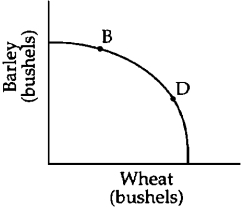Exam 3: The Fundamental Economic Problem: Scarcity and Choice
Exam 1: What Is Economics?227 Questions
Exam 2: The Economy: Myth and Reality150 Questions
Exam 3: The Fundamental Economic Problem: Scarcity and Choice250 Questions
Exam 4: Supply and Demand: An Initial Look308 Questions
Exam 5: An Introduction to Macroeconomics211 Questions
Exam 6: The Goals of Macroeconomic Policy207 Questions
Exam 7: Economic Growth: Theory and Policy223 Questions
Exam 8: Aggregate Demand and the Powerful Consumer214 Questions
Exam 9: Demand-Side Equilibrium: Unemployment or Inflation?211 Questions
Exam 10: Bringing in the Supply Side: Unemployment and Inflation?223 Questions
Exam 11: Managing Aggregate Demand: Fiscal Policy205 Questions
Exam 12: Money and the Banking System219 Questions
Exam 13: Monetary Policy: Conventional and Unconventional205 Questions
Exam 14: The Financial Crisis and the Great Recession61 Questions
Exam 15: The Debate over Monetary and Fiscal Policy214 Questions
Exam 16: Budget Deficits in the Short and Long Run210 Questions
Exam 17: The Trade Off between Inflation and Unemployment214 Questions
Exam 18: International Trade and Comparative Advantage226 Questions
Exam 19: The International Monetary System: Order or Disorder?213 Questions
Exam 20: Exchange Rates and the Macroeconomy214 Questions
Select questions type
Carefully define the following terms and explain their importance to the study of economics.
a.resources
b.rational decision
c.scarcity
d.opportunity cost
(Essay)
4.8/5  (37)
(37)
The principle of comparative advantage helps explain trade between nations.
(True/False)
4.9/5  (40)
(40)
Karl Marx was critical of markets on the grounds that they are not efficient.
(True/False)
4.8/5  (32)
(32)
Figure 3-1
 -The shape of the production possibilities frontier in Figure 3-1 implies that
-The shape of the production possibilities frontier in Figure 3-1 implies that
(Multiple Choice)
4.8/5  (47)
(47)
Which of the following events create an outward shift of the production possibilities curve?
(Multiple Choice)
4.8/5  (37)
(37)
According to Baumol and Blinder,recognition of the usefulness of markets
(Multiple Choice)
4.9/5  (25)
(25)
If you discover that the opportunity cost of raising your economics grade is zero,you
(Multiple Choice)
4.9/5  (36)
(36)
In a market economy,government decides the answers to the three economic decisions.
(True/False)
4.7/5  (40)
(40)
In terms of the production possibilities diagram,the principle of increasing cost simply asserts that the frontier is
(Multiple Choice)
4.8/5  (25)
(25)
If Japan and the United States engage in trade,and Japan gains as a result of the trade,does that mean the United States has lost in some manner?
(Essay)
4.8/5  (38)
(38)
Scarcity of resources implies that people must make decisions consistent with the means they have available to them.
(True/False)
4.8/5  (43)
(43)
In early 1996,the upper Midwest suffered record cold,with wind chills of fifty degrees below zero or worse.Yet,grocery stores stocked fresh citrus fruit (obviously not grown locally).Why did grocers stock the fruit?
(Multiple Choice)
4.7/5  (38)
(38)
According to the principle of increasing costs,as the production of one good expands,the opportunity cost of producing another unit of the good tends to increase.
(True/False)
4.8/5  (29)
(29)
As the term "opportunity cost" is defined in the text,the opportunity cost of going to college includes
(Multiple Choice)
4.8/5  (41)
(41)
What mechanism assures that producers use inputs efficiently?
(Multiple Choice)
5.0/5  (36)
(36)
Economics examines the options open to households,business firms,governments,and entire societies by the limited resources at their command.
(True/False)
4.9/5  (37)
(37)
Since it spent over $3.6 trillion in 2010,opportunity cost was not an issue for the U.S.government.
(True/False)
4.8/5  (43)
(43)
Showing 81 - 100 of 250
Filters
- Essay(0)
- Multiple Choice(0)
- Short Answer(0)
- True False(0)
- Matching(0)